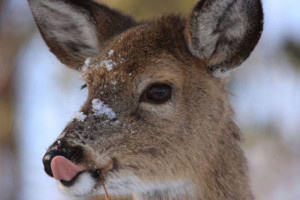Elen of the Ways
Again from my forthcoming book on animal divination:
An increasingly popular conception of the Deer Goddess goes by the name of Elen or Elen of the Ways. Knowledge about this goddess was disseminated through the research of Caroline Wise(1) on Elen of the Hosts, who appears in a short section of the Welsh Mabinogion. While researching ley lines in Britain, Wise discovered this passage:
…Elen thought to make high roads from one stronghold to another across the Island of Britain. And the roads were made. And for that reason they are called the Roads of Elen of the Hosts, because she was sprung from the Island of Britain, and the men of the Island of Britain would not have made those great hostings for any save for her.(2)
The “hosts” refers to the army that utilized Elen’s roads. Elen of the Hosts is a historical figure, the queen of a usurper in the Gaulish Empire who assassinated the Emperor Gracian. Also known as Saint Helen (and not to be confused with the Saint Helen who is mother of the Emperor Constantine), she is reputed to have established Christianity in Wales. Wise theorized that the roads of Saint Helen were created by migrating reindeer, and that the Elen of the Hosts described in the Mabinogion is conflated with an older deer goddess. The most convincing part of her argument, from a scholarly point of view, is the prevalence of deer words sounding like Elen in many European languages. My Google translator confirms that “eilit” is Irish Gaelic for “doe,” while “jelen” is Polish for “deer” and “elen” is Bulgarian for “deer.” “Elain” is Finnish for “animal.” The Dictionary of Word Origins has this to say about the English word “elk”:
The Indo-European base *ol-, *el- produced a number of words for deer-like animals – Greek elaphos ‘stag,’ for example and Welsh elain ‘hind,’ not to mention English eland.(3)
“Elen” may be a root Indo-European word for “deer,” and if so would be an appropriate appellation for the Deer Goddess. If the roads of Elen were established by reindeer, however, it is doubtful that a reindeer goddess was worshiped on the British Isles at that earlier time by that name, since the large scale Indo-European migrations, unlike those of the reindeer, were fairly recent.
The most compelling case for Elen as a deer deity is the number of people who attest to connecting strongly with a deer goddess by this name. Chesca Potter seems to be the first modern artist to channel Elen as Reindeer Woman in the 1980s, but Elen is probably now the most commonly depicted Horned Goddess.
(1) Caroline Wise, “Elen of the Ways,” andrewcollins.com, http://www.andrewcollins.com/page/articles/elen_1.htm accessed July 9, 2016.
(2)The Mabinogion, translated by Gwen Jones and Thomas Jones, (New York: Alfred A. Knopf, 2001), 77.
(3) John Ayto, Dictionary of Word Origins, (New York: Arcade), 197.
Further Reading
Wise, Caroline. Finding Elen: The Quest for Elen of the Ways. London: Eala Press, 2015.
Sentier, Elen. Elen of the Ways: Following the Deer Trods Hants, UK: Moon Books, 2013.

